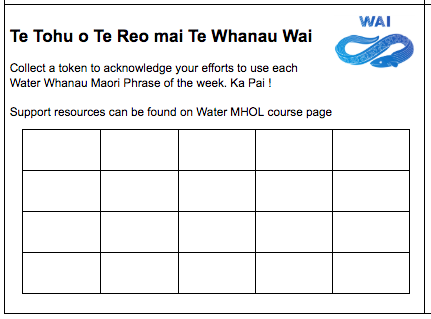Te Tohu o Te Reo mai Te Whanau Wai
Section outline
-
Water Whanau Te Reo Phrase of the Water
Use your Water Card and collect a token to acknowledge your use of Te Reo. In your Monday Session 1 class the phrase of the week will be introduced. Monday is practice day. Then try your best to use the phrase in conversation over the week and collect a token each time.
Your teachers are also part of this - catch them trying to use the phrase in conversation.
We would like to acknowledge Radio New Zealand and Hemi Kelly, to whom resources we are using. Hemi's a lecturer in Te Ara Poutama - the Faculty of Māori & Indigenous Development at Auckland University of Technology, and his book A Māori Phrase a Day: 365 Phrases to Kickstart Your Reo will be released on January 7.
